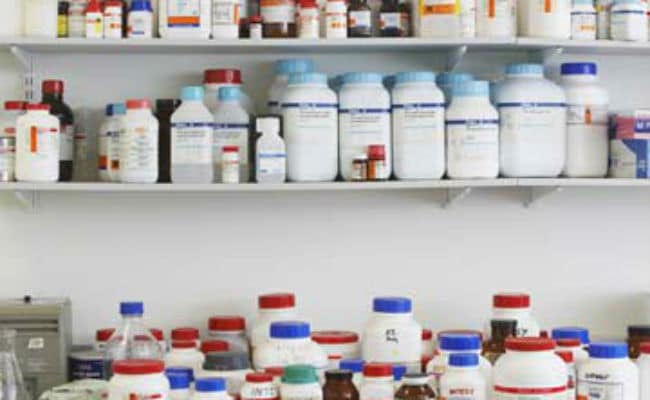
Fake or low-quality medicines and food supplements are an ongoing global problem in developing nations. (Representational Image)
Washington:
Scientists, including those of Indian-origin, are developing a low-cost, portable device to authenticate medicines and supplements in order to prevent incorrectly labelled or fake pills from reaching consumers.
Fake or low-quality medicines and food supplements are an ongoing global problem in developing nations, although technology-savvy countries are also not immune.
"There is a big problem with counterfeit and substandard medicines in poorer countries, particularly in Africa and Asia," said Soumyajit Mandal, assistant professor at the Case Western Reserve University in US.
Researchers, including Swarup Bhunia of the University of Florida, are developing a small, box-like detector that has been preliminary tested in field trials.
"The required instrumentation is simple and low-cost, compared to other analytical techniques, such as optical spectroscopy," Mr Mandal said.
"We think our technology will have an important positive impact on public health by enabling consumers to directly authenticate the contents in packets or bottles without having to send samples to an analytical chemistry lab," Mr Mandal said.
A medicine or dietary supplement might be incorrectly labelled for a variety of reasons - intentional fraud, poor manufacturing practices and degradation due to poor storage or post-expiration date.
The key to detection is to know the proper active pharmaceutical ingredients (API) in a medicine or supplement, so technicians can determine whether a pill or powder is what it appears to be.
The device uses Nuclear Quadrupole Resonance (NQR) spectroscopy, a non-invasive and non-destructive analytical technique for medicines and supplements in pill or powder form. Most chemical elements have nuclei that generate NQR signals. Almost all medicines have API with NQR-active nuclei.
The researchers propose a "chemometric passport approach" for quality assurance. Data on packaged medicines will be derived from a spectroscopic analysis performed at the point of manufacture.
The contents of the packet will later be authenticated by matching the results of another spectroscopic analysis using unique chemical identifiers from a reference spectrum.
Authentication information can be accessed either from a secure database stored in the cloud, or from information encoded directly within the product barcode.
The absence of a match triggers a "contents don't match the label" alarm on the testing device.
Mr Mandal said that capability would be particularly useful at customs checkpoints and postal sorting offices when a barcode might not be visible.
One day, he said, a person might be able to test his or her own medicines or supplements at home, which would have a direct effect on public health.
The research appears in the journal IEEE/ACM Transactions on Computational Biology and Bioinformatics.
Fake or low-quality medicines and food supplements are an ongoing global problem in developing nations, although technology-savvy countries are also not immune.
"There is a big problem with counterfeit and substandard medicines in poorer countries, particularly in Africa and Asia," said Soumyajit Mandal, assistant professor at the Case Western Reserve University in US.
Researchers, including Swarup Bhunia of the University of Florida, are developing a small, box-like detector that has been preliminary tested in field trials.
"The required instrumentation is simple and low-cost, compared to other analytical techniques, such as optical spectroscopy," Mr Mandal said.
"We think our technology will have an important positive impact on public health by enabling consumers to directly authenticate the contents in packets or bottles without having to send samples to an analytical chemistry lab," Mr Mandal said.
A medicine or dietary supplement might be incorrectly labelled for a variety of reasons - intentional fraud, poor manufacturing practices and degradation due to poor storage or post-expiration date.
The key to detection is to know the proper active pharmaceutical ingredients (API) in a medicine or supplement, so technicians can determine whether a pill or powder is what it appears to be.
The device uses Nuclear Quadrupole Resonance (NQR) spectroscopy, a non-invasive and non-destructive analytical technique for medicines and supplements in pill or powder form. Most chemical elements have nuclei that generate NQR signals. Almost all medicines have API with NQR-active nuclei.
The researchers propose a "chemometric passport approach" for quality assurance. Data on packaged medicines will be derived from a spectroscopic analysis performed at the point of manufacture.
The contents of the packet will later be authenticated by matching the results of another spectroscopic analysis using unique chemical identifiers from a reference spectrum.
Authentication information can be accessed either from a secure database stored in the cloud, or from information encoded directly within the product barcode.
The absence of a match triggers a "contents don't match the label" alarm on the testing device.
Mr Mandal said that capability would be particularly useful at customs checkpoints and postal sorting offices when a barcode might not be visible.
One day, he said, a person might be able to test his or her own medicines or supplements at home, which would have a direct effect on public health.
The research appears in the journal IEEE/ACM Transactions on Computational Biology and Bioinformatics.
Track Latest News Live on NDTV.com and get news updates from India and around the world

